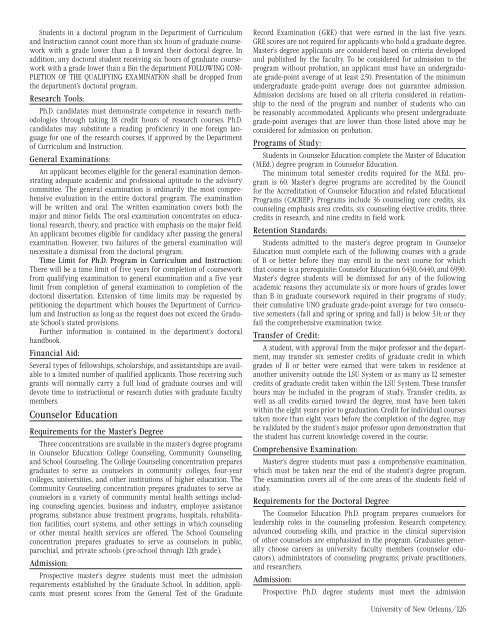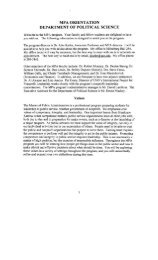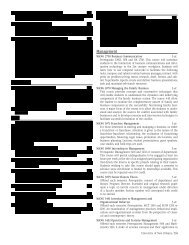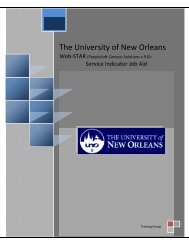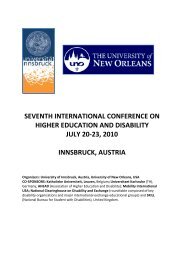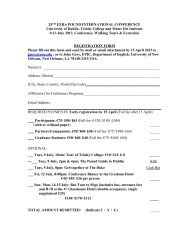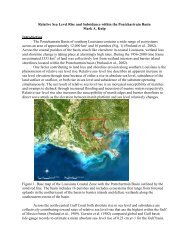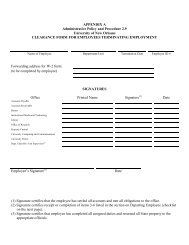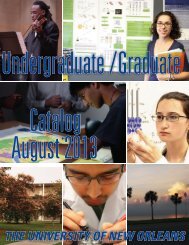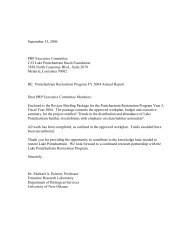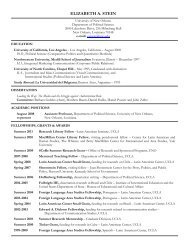Untitled - University of New Orleans
Untitled - University of New Orleans
Untitled - University of New Orleans
Create successful ePaper yourself
Turn your PDF publications into a flip-book with our unique Google optimized e-Paper software.
Students in a doctoral program in the Department <strong>of</strong> Curriculum<br />
and Instruction cannot count more than six hours <strong>of</strong> graduate coursework<br />
with a grade lower than a B toward their doctoral degree. In<br />
addition, any doctoral student receiving six hours <strong>of</strong> graduate coursework<br />
with a grade lower than a Bin the department FOLLOWING COM-<br />
PLETION OF THE QUALIFYING EXAMINATION shall be dropped from<br />
the department’s doctoral program.<br />
Research Tools:<br />
Ph.D. candidates must demonstrate competence in research methodologies<br />
through taking 18 credit hours <strong>of</strong> research courses. Ph.D.<br />
candidates may substitute a reading pr<strong>of</strong>iciency in one foreign language<br />
for one <strong>of</strong> the research courses, if approved by the Department<br />
<strong>of</strong> Curriculum and Instruction.<br />
General Examinations:<br />
An applicant becomes eligible for the general examination demonstrating<br />
adequate academic and pr<strong>of</strong>essional aptitude to the advisory<br />
committee. The general examination is ordinarily the most comprehensive<br />
evaluation in the entire doctoral program. The examination<br />
will be written and oral. The written examination covers both the<br />
major and minor fields. The oral examination concentrates on educational<br />
research, theory, and practice with emphasis on the major field.<br />
An applicant becomes eligible for candidacy after passing the general<br />
examination. However, two failures <strong>of</strong> the general examination will<br />
necessitate a dismissal from the doctoral program.<br />
Time Limit for Ph.D. Program in Curriculum and Instruction:<br />
There will be a time limit <strong>of</strong> five years for completion <strong>of</strong> coursework<br />
from qualifying examination to general examination and a five year<br />
limit from completion <strong>of</strong> general examination to completion <strong>of</strong> the<br />
doctoral dissertation. Extension <strong>of</strong> time limits may be requested by<br />
petitioning the department which houses the Department <strong>of</strong> Curriculum<br />
and Instruction as long as the request does not exceed the Graduate<br />
School’s stated provisions.<br />
Further information is contained in the department’s doctoral<br />
handbook.<br />
Financial Aid:<br />
Several types <strong>of</strong> fellowships, scholarships, and assistantships are available<br />
to a limited number <strong>of</strong> qualified applicants. Those receiving such<br />
grants will normally carry a full load <strong>of</strong> graduate courses and will<br />
devote time to instructional or research duties with graduate faculty<br />
members.<br />
Counselor Education<br />
Requirements for the Master’s Degree<br />
Three concentrations are available in the master’s degree programs<br />
in Counselor Education: College Counseling, Community Counseling,<br />
and School Counseling. The College Counseling concentration prepares<br />
graduates to serve as counselors in community colleges, four-year<br />
colleges, universities, and other institutions <strong>of</strong> higher education. The<br />
Community Counseling concentration prepares graduates to serve as<br />
counselors in a variety <strong>of</strong> community mental health settings including<br />
counseling agencies, business and industry, employee assistance<br />
programs, substance abuse treatment programs, hospitals, rehabilitation<br />
facilities, court systems, and other settings in which counseling<br />
or other mental health services are <strong>of</strong>fered. The School Counseling<br />
concentration prepares graduates to serve as counselors in public,<br />
parochial, and private schools (pre-school through 12th grade).<br />
Admission:<br />
Prospective master’s degree students must meet the admission<br />
requirements established by the Graduate School. In addition, applicants<br />
must present scores from the General Test <strong>of</strong> the Graduate<br />
Record Examination (GRE) that were earned in the last five years.<br />
GRE scores are not required for applicants who hold a graduate degree.<br />
Master’s degree applicants are considered based on criteria developed<br />
and published by the faculty. To be considered for admission to the<br />
program without probation, an applicant must have an undergraduate<br />
grade-point average <strong>of</strong> at least 2.50. Presentation <strong>of</strong> the minimum<br />
undergraduate grade-point average does not guarantee admission.<br />
Admission decisions are based on all criteria considered in relationship<br />
to the need <strong>of</strong> the program and number <strong>of</strong> students who can<br />
be reasonably accommodated. Applicants who present undergraduate<br />
grade-point averages that are lower than those listed above may be<br />
considered for admission on probation.<br />
Programs <strong>of</strong> Study:<br />
Students in Counselor Education complete the Master <strong>of</strong> Education<br />
(M.Ed.) degree program in Counselor Education.<br />
The minimum total semester credits required for the M.Ed. program<br />
is 60. Master’s degree programs are accredited by the Council<br />
for the Accreditation <strong>of</strong> Counselor Education and related Educational<br />
Programs (CACREP). Programs include 36 counseling core credits, six<br />
counseling emphasis area credits, six counseling elective credits, three<br />
credits in research, and nine credits in field work.<br />
Retention Standards:<br />
Students admitted to the master’s degree program in Counselor<br />
Education must complete each <strong>of</strong> the following courses with a grade<br />
<strong>of</strong> B or better before they may enroll in the next course for which<br />
that course is a prerequisite: Counselor Education 6430, 6440, and 6990.<br />
Master’s degree students will be dismissed for any <strong>of</strong> the following<br />
academic reasons: they accumulate six or more hours <strong>of</strong> grades lower<br />
than B in graduate coursework required in their programs <strong>of</strong> study;<br />
their cumulative UNO graduate grade-point average for two consecutive<br />
semesters (fall and spring or spring and fall) is below 3.0; or they<br />
fail the comprehensive examination twice.<br />
Transfer <strong>of</strong> Credit:<br />
A student, with approval from the major pr<strong>of</strong>essor and the department,<br />
may transfer six semester credits <strong>of</strong> graduate credit in which<br />
grades <strong>of</strong> B or better were earned that were taken in residence at<br />
another university outside the LSU System or as many as 12 semester<br />
credits <strong>of</strong> graduate credit taken within the LSU System. These transfer<br />
hours may be included in the program <strong>of</strong> study. Transfer credits, as<br />
well as all credits earned toward the degree, must have been taken<br />
within the eight years prior to graduation. Credit for individual courses<br />
taken more than eight years before the completion <strong>of</strong> the degree, may<br />
be validated by the student’s major pr<strong>of</strong>essor upon demonstration that<br />
the student has current knowledge covered in the course.<br />
Comprehensive Examination:<br />
Master’s degree students must pass a comprehensive examination,<br />
which must be taken near the end <strong>of</strong> the student’s degree program.<br />
The examination covers all <strong>of</strong> the core areas <strong>of</strong> the students field <strong>of</strong><br />
study.<br />
Requirements for the Doctoral Degree<br />
The Counselor Education Ph.D. program prepares counselors for<br />
leadership roles in the counseling pr<strong>of</strong>ession. Research competency,<br />
advanced counseling skills, and practice in the clinical supervision<br />
<strong>of</strong> other counselors are emphasized in the program. Graduates generally<br />
choose careers as university faculty members (counselor educators),<br />
administrators <strong>of</strong> counseling programs, private practitioners,<br />
and researchers.<br />
Admission:<br />
Prospective Ph.D. degree students must meet the admission<br />
<strong>University</strong> <strong>of</strong> <strong>New</strong> <strong>Orleans</strong>/126


